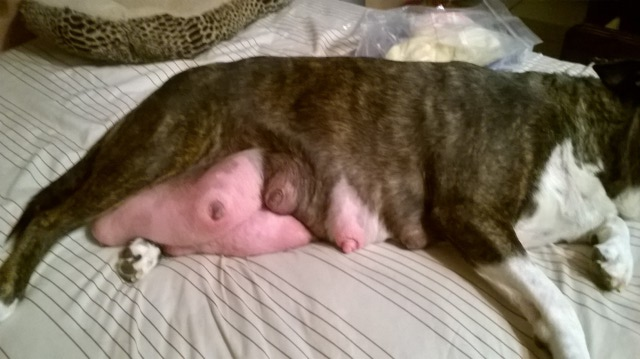QuestionI adopted a chocolate lab from a rescue recently and they sent me her medical history report from the vet. Bailie, my lab, is 7 months old and we have owned her for 3 months. She was in terrible environment, with no human contact except for an occasional feeding. She is terrified of people but has become very happy and comfortable with our family and our other lab, Maggie, who she adores. On her medical report I saw that she was treated for furunculosis. I have read other posts regarding this and I noticed that recurring ear infections are associated with this. I see no signs of furunculosis but she does problems with her ears. I know from owning other labs that yeast infections are common in labs, but do you think that this could still be a side effect from the furunculosis? She was and still is underweight, but we are working on that. She is fed Eagle Pack wet mixed with Eagle Pack Dry twice a day and I supplement her food with Nupro Silver. Total she eats 2 1/2 cups of dry 1 can wet per day. She currently weighs 51lbs. The vet and our trainer, feel her nervous condition add to her weight problem. I mention the food because I know allergies can cause ear problems and I wanted to see if you think the food could be causing the ear infections. Since we have owned her and had her on the Eagle Pack, her coat has improved tremendously. She had dandruff and her coat was rough. She is pretty much done blowing her coat for the spring and the coat underneath is shiny and healthy. Sorry to digress, but she has been through so much, I want to make the rest of her life as happy and healthy as possible. Thank you!
AnswerHi Lisa,
Furunculosis (also known as Boils) is an acute skin disease characterized by the presence of many "furuncles", which are sometimes full of pus. Although they can be found almost anywhere, they frequent appear on the sides of the chest and legs, especially on the protruding bones, in the webbing between the toes, and around the anus.
When you saw your dog's medical report, did it specifically state that the Furunculosis was in her ears?
If your dog continues to have skin eruptions, talk to your vet about using a supplement of omega n3 fatty acids.
Changing your dog's food can help, but you need to find a new food with with ingredients that a dog has never eaten before (otherwise, why switch?!).
Since food allergies are thought to occur only to foods that the dog has been sensitized to, there should not be an allergic reaction to a food that has not been eaten previously. An early diet to achieve this purpose was lamb and rice but now both of these ingredients are used in other dog foods and so this combination is less likely to be helpful. More exotic protein sources like ostrich meat, alligator meat, duck, venison, rabbit, etc. are usually used and potato, peas and rice (still) are sometimes used as the carbohydrate source.
Other possibilities include food allergies and immune system deficiencies or disorders, and hormonal skin disease. You should talk all of this over with your vet.
If your dog is underweight, it's okay to give her a little more than the feeding guidelines recommend. Of course, once she starts to fill out, you can cut back.
Some dogs are just more nervous than others, no matter the breed. Diet won't change that. It could be that your dog is not the breed standard as far as temperament goes, but she still can be a wonderful pet.
If your dog is having recurring ear infections, you (and your vet) need to identify and treat the underlying cause and not simply treat the symptoms.
The most common underlying cause is allergy, then probably immunosuppressive disorders (Cushing's would fall in this category) and then hormonal disorders, with hypothyroidism being the most common hormonal disorder associated with persistent ear infections. Identifying the infecting organism is sometimes possible through examination of a smear of ear contents under a microscope. Culture and sensitivity testing of the ear canal can also be beneficial.
Doing some simple maintenance between infections, would help too. Rinsing the ears with white vinegar mixed half and half with water (1:1 ratio) once or twice a week helps a lot in controlling recurrent ear infections.
I hope I've been a help.
Best of luck,
Patti

 What is my dog
Question
This is the mystery do
a year ago a 11month ol
What is my dog
Question
This is the mystery do
a year ago a 11month ol
 puppy behavior
Question
Cooper and Guy
Hi, thanks so much for reading
puppy behavior
Question
Cooper and Guy
Hi, thanks so much for reading
 re: dog breed
Question
Dog pic question about
Hi Patti,
I took in a
re: dog breed
Question
Dog pic question about
Hi Patti,
I took in a
 mixed breed dog
QuestionSweetie Monster
QUESTION: hi this may be
mixed breed dog
QuestionSweetie Monster
QUESTION: hi this may be
 Engorged Breasts
Question
mamma
My Friends Dog Had A Litter About
Engorged Breasts
Question
mamma
My Friends Dog Had A Litter About